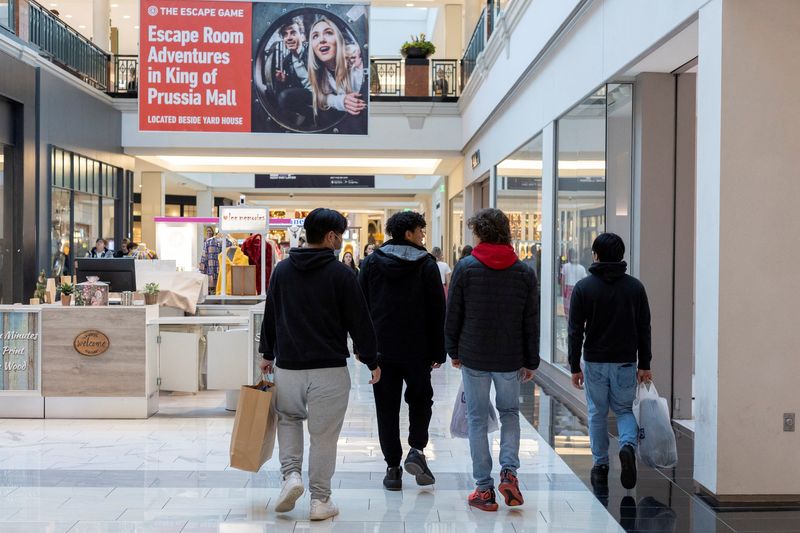US retail lobbyists retract key claim on 'organized' retail crime
Reuters
Published Dec 05, 2023 08:23PM ET

By Katherine Masters
NEW YORK (Reuters) - The main lobbying group for U.S. retailers retracted its claim that "organized retail crime" accounted for nearly half of all inventory losses in 2021 after finding that incorrect data was used for its analysis.
A spokesperson for the National Retail Federation said Tuesday that the organization had removed the sentence from its report on organized retail crime published in April. It produced the report in collaboration with private security firm K2 Integrity.
The research -- which was edited in late November, according to NRF’s website -- previously stated that “nearly half” of the $94.5 billion in inventory losses reported by retailers in a 2021 survey “was attributable” to organized retail crime.
Retail executives and law enforcement officials use the term organized retail crime to describe coordinated groups of thieves who shoplift or steal from retailers' warehouses and trucks, reselling stolen merchandise on the black market.
The NRF's claim that organized retail crime accounted for "nearly half" of inventory losses was repeated in multiple media reports on the issue. The NRF has cited growing rates of crime in calls for Congress to pass new laws, including proposed legislation that would broaden the scope of offenses considered “organized” crime and increase potential penalties.
According to NRF spokesperson Danielle Inman, the claim that organized crime accounted for nearly half of all inventory losses was based on two-year-old testimony from Ben Dugan, former president of the advocacy group Coalition of Law Enforcement and Retail. In 2021, he told a U.S. Senate committee that organized retail crime accounted for $45 billion in annual losses for retailers, according to estimates by the coalition.
The inclusion of the claim in NRF’s report was “taken directly from Ben’s testimony” and “was an inference made by the K2 analyst linking the results of the NRF survey from 2021 and Ben Dugan’s statement made that same year,” Inman said.
K2 Integrity did not immediately respond to a request for comment. Dugan could not immediately be reached for comment on how the coalition calculated the $45 billion figure.
The NRF also removed references to the coalition’s research in its April report.
The NRF's retraction highlights ongoing difficulties in quantifying the role crime plays in “shrink” -- another industry term for inventory losses due to any cause, from shipping mistakes to clerical errors.
Some law enforcement sources, including a November report from the Council on Criminal Justice, suggest that shoplifting outside major cities like New York has decreased since the start of the COVID-19 pandemic. Many retailers, however, say that shoplifting is widely underreported and crime statistics do not accurately reflect the scope of the problem.
Target, DICK’s Sporting Goods and Walgreens are among major retailers that have cited rising crime as a significant drag on profitability, though some have since walked back on those concerns. In a January earnings call, Walgreens’ CEO told investors that “maybe we cried too much” when reporting rising shoplifting the previous year.
Industry data, on the other hand, is often “noisy” or conflates broader statistics on shrink with those on organized retail crime, according to Trevor Wagener, chief economist for the Computer & Communications Industry Association, which has analyzed retail crime data on behalf of members such as Amazon.com (NASDAQ:AMZN) and Apple (NASDAQ:AAPL).
He pointed to the Retail Industry Leaders Association’s recent estimate that organized crime cost U.S. retailers nearly $70 billion a year, which relied on data from five Fortune 500 companies RILA described as “some of the largest retailers in the country.”
“That’s a very significant extrapolation, especially in an industry where it’s well known that shrink issues vary quite a bit depending on the category of the retailer,” Wagener said.

A spokesperson for RILA said the group "stand (s) by the data from our 2021 report."
NRF data from its annual Retail Security Survey indicates that the percentage of shrink attributed to external theft, including organized retail crime, has largely remained around 36% since 2015.
Written By: Reuters
Trading in financial instruments and/or cryptocurrencies involves high risks including the risk of losing some, or all, of your investment amount, and may not be suitable for all investors. Prices of cryptocurrencies are extremely volatile and may be affected by external factors such as financial, regulatory or political events. Trading on margin increases the financial risks.
Before deciding to trade in financial instrument or cryptocurrencies you should be fully informed of the risks and costs associated with trading the financial markets, carefully consider your investment objectives, level of experience, and risk appetite, and seek professional advice where needed.
Fusion Media would like to remind you that the data contained in this website is not necessarily real-time nor accurate. The data and prices on the website are not necessarily provided by any market or exchange, but may be provided by market makers, and so prices may not be accurate and may differ from the actual price at any given market, meaning prices are indicative and not appropriate for trading purposes. Fusion Media and any provider of the data contained in this website will not accept liability for any loss or damage as a result of your trading, or your reliance on the information contained within this website.
It is prohibited to use, store, reproduce, display, modify, transmit or distribute the data contained in this website without the explicit prior written permission of Fusion Media and/or the data provider. All intellectual property rights are reserved by the providers and/or the exchange providing the data contained in this website.
Fusion Media may be compensated by the advertisers that appear on the website, based on your interaction with the advertisements or advertisers.